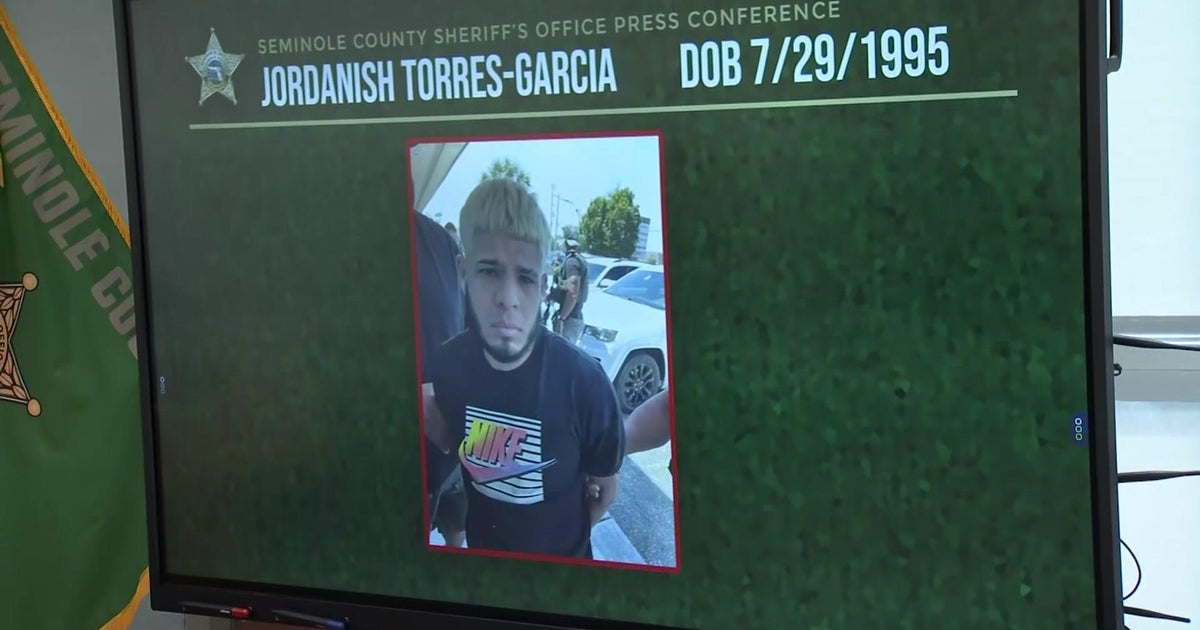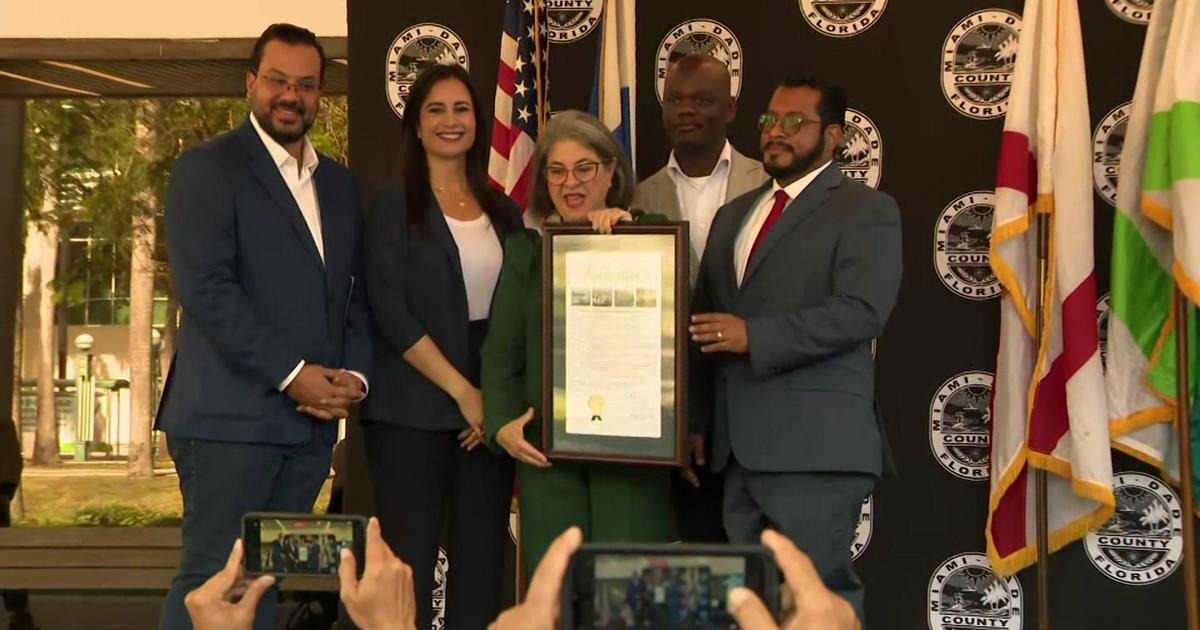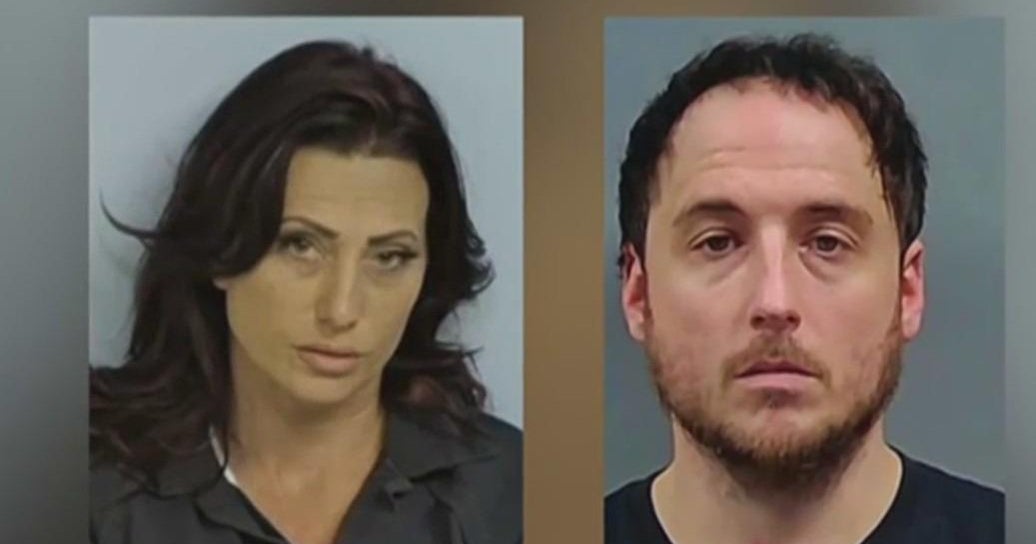Wasserman Schultz, Canova Engage In Heated Debate
Follow CBSMIAMI.COM: Facebook | Twitter
MIAMI (CBSMiami) – In their first and only scheduled debate, Congresswoman Debbie Wassermann Schultz accused her primary opponent of supporting policies that would endanger Israel, while her challenger, Nova Southeastern law professor Tim Canova, portrayed the six-term Congresswoman as a creature of Washington more interested in protecting moneyed special interests than her own constituents.
"For her entire career she has raised millions of dollars from some of the largest corporations and Wall Street banks," Canova said, during the hour-long debate on CBS4's Facing South Florida
The contest has drawn national attention because of Wasserman Schultz's recent ouster as chair of the Democratic National Committee and because it is seen as a proxy war between those who supported Hillary Clinton during the primary and those who followed Bernie Sanders.
Wasserman Schultz has the backing of Democratic Party's establishment including President Obama, Vice President Joe Biden, and Democratic nominee Clinton – all of whom have come to South Florida in recent weeks to campaign for her.
Canova is a first time candidate who gained the early endorsement of Bernie Sanders. Canova has used that endorsement to tap into the legion of Sander's supporters who have pumped millions into his campaign. As a result, Canova has raised nearly $3 million – an unheard of amount for a no-name candidate.
During the debate, CBS4 moderator Jim DeFede asked Canova if he wasn't so much a candidate but a tool used by Sanders supporters around the country to attack Wasserman Schultz, who has long been the focus of their anger.
"I don't see that at all," Canova said. "If I had a different kind of politics I would not get this support nationwide that I have."
Wasserman Schulz repeatedly attacked Canova as an outsider.
"My opponent wants to run away from the fact that over 90 percent of the support he has financially is from people outside the state of Florida," she said.
At the outset of the debate, Wasserman Schultz was forced to play defense as she was asked a series of questions over the leaked emails from the DNC which showed party staffers favoring Clinton over Sanders. The emails, released by WikiLeaks, led to Wasserman Schultz's removal as DNC chair.
In one series of emails, several DNC staffers discuss using Sanders' religious beliefs and the possibility he was an atheist as a way of undermining him in the South.
"I absolutely condemn and condemned that email exchange and that person is no longer working for the DNC," she said.
"But what does it say that they were able to do that, that they would even feel free enough to send an email like that," DeFede asked. "Is that the culture you created there?"
"Of course not," she replied. "I'm very proud of my tenure at the Democratic National Committee."
Some of the emails also revealed how DNC staff kept track of Canova's movements.
Wasserman Schultz said the DNC staff did nothing improper when it came to Canova. She said they were simply interested in following her race.
"I know how to run my own campaign," she said. "I didn't need anyone to help me, I'm just fine, I've won every election where I've been on the ballot."
Countered Canova: "Those WikiLeak email disclosures do show a pattern of monitoring the campaign. I appreciate what the Congresswoman is saying, that she's won every election, but she has never had a contested primary."
But rather than drive home the point and try to keep Wasserman Schultz on the ropes, he made a joke about nobody caring about her emails – a play on the line Bernie Sanders used during his debate with Hillary Clinton.
On Sunday, however, it fell flat and actually undermined what he had said previously. Canova had recently filed a complaint with the Federal Election Commission about the DNC support for Wasserman Schultz.
Time and again Canova missed opportunities to press his case against Wasserman Schultz. Given the fairly easy question on how he would attempt to pass a $15 an hour federal minimum wage, Canova spoke briefly about building a coalition with labor and then seemed stymied, before finally turning to DeFede, the moderator, and asking: "You tell me how do we get to $15 an hour minimum wage?"
Without missing a beat, Wasserman Schultz jumped in: "I'd be happy to tell you."
In another exchange, Canova was asked to "make the case" as to why he believes Wasserman Schultz was out of touch with her community and too beholden to special interests.
However, rather than connect the dots between Wasserman Schultz's campaign donors and votes she's taken to benefit them, Canova cited a recent 60 Minutes story about how members of Congress spend as much as 30 hours a week seeking campaign contributions.
Canova also struggled to dispel her criticism of him that he has only lived in the district for a few years and doesn't really know the community.
At one point in the debate, DeFede asked Canova: "Do you know who the mayor of Southwest Ranches is?"
"I'm not going to play that game," Canova said. "No, I do not. And I'm not going to play that game."
"It's Jeff Nelson by the way," Wasserman Schultz chimed in.
"Very good, thank you very much," Canova said, annoyed.
"He's also the assistant principal at Cypress Bay High School," she added with a smile.
"I do know who my students are at Nova Southeastern University," Canova shot back. "And for the last four years I have taught hundreds and hundreds of students there. I have spent more time in this district in the last four years than the Congresswoman has."
On the issue of medical marijuana, Canova said he supports the amendment on the ballot this November. Wasserman Schultz, however, continued to duck the question and say she has not made up her mind.
The two went at it again on Social Security with Canova criticizing Wasserman Schultz, claiming she only signed on to sponsor a bill increasing benefits for seniors because he raised it as an issue in his campaign.
"She became a co-sponsor in June and July of 2016," he said. "That is the truth, you can look it up."
"My record is very, very clear," she replied. "And this is a silly argument."
"It's not silly," he said. "To 125,000 seniors in Broward County and Miami-Dade who are looking for an increase in their Supplemental Security Income, it's not a silly argument."
Some of their sharpest exchanges came on the issue of Israel.
"He supports disarmament in the Middle East including Israel," Wasserman Schultz charged. "Which anyone who supports Israel would understand jeopardizes Israel's security."
"I support disarmament in that region and I actually never singled out Israel whatsoever as the problem," he said.
Wasserman Schultz countered: "Israel is in the Middle East, last time I checked."
Despite his rocky debate performance, Canova may have found an issue that he can use against Wasserman Schultz in the closing minute of the debate.
In his last question, DeFede asked: "Would you both support a ban on fracking in the state of Florida?"
"I would," Canova responded promptly.
Wasserman Schultz, however, was less certain.
"I think we need to strongly regulate fracking and make sure we protect our environment in the process," she said.
Environmentalists are deeply opposed to fracking.
To watch the entire debate, you can click here.



